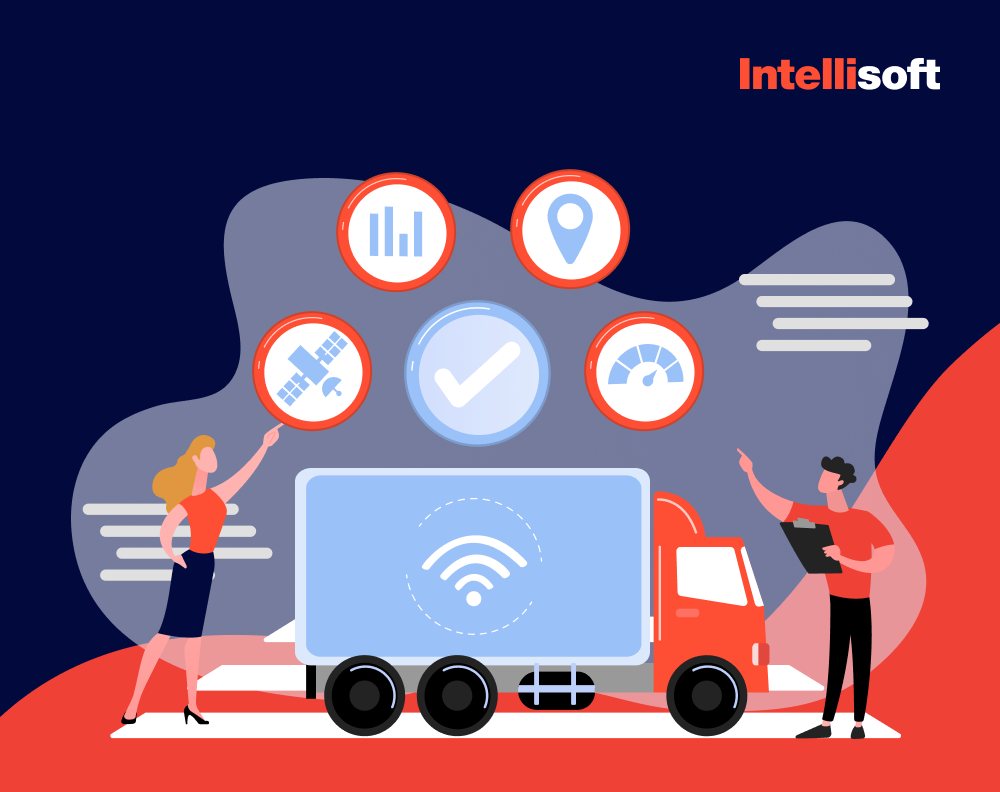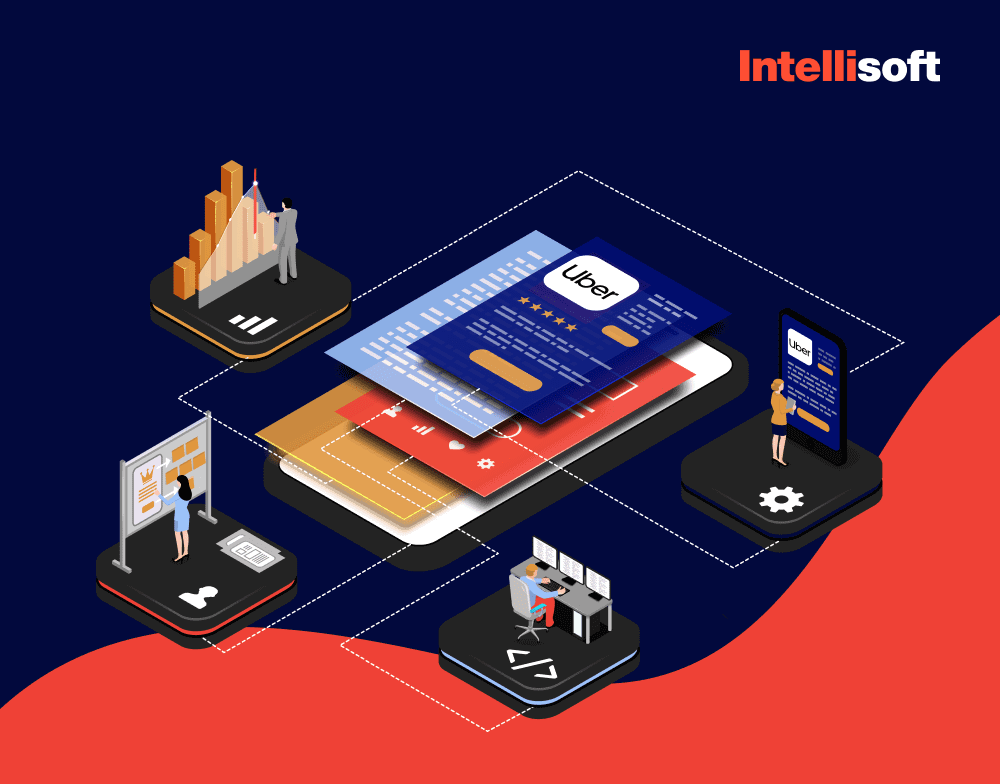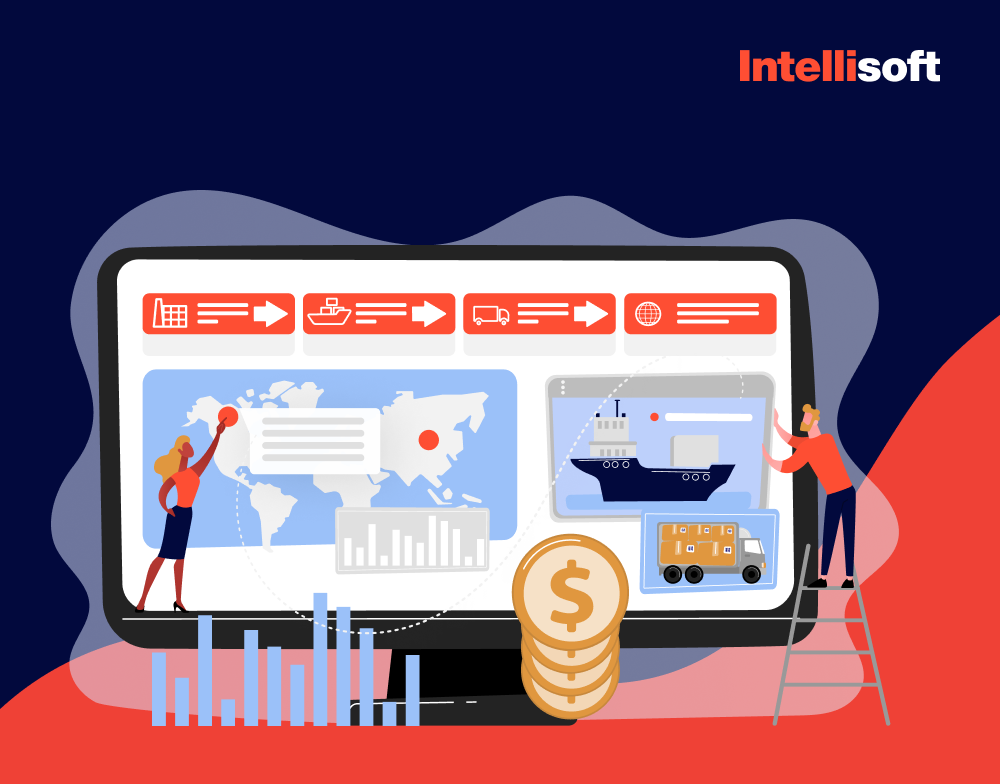If you’re working in the logistics and transportation sector, this guide can become your golden ticket to understanding and mastering the world of Freight Management Systems (FMS). Now, let’s cut to the chase. You’re here because you want to know what’s brewing in the world of freight management, and you’ve knocked on the right door. Welcome to IntelliSoft’s comprehensive guide on freight management system development.
But why IntelliSoft? Our company has been the backstage magician for prominent clients worldwide, turning complex logistics challenges into streamlined, tech-driven solutions. After years of experience in logistics, and a deep understanding of the latest tech trends, we are well-equipped to guide you through FMS development.
Table of Contents
The Evolution of Freight Management
Let’s look back to the early days of freight management. In the pre-digital era, logistics was all about paper trails, manual calculations, and a whole lot of guesswork. The process was as cumbersome as trying to text on a flip phone – functional but not exactly efficient.
Back then, managing freight was a high-stakes balancing act. Businesses relied heavily on physical ledgers, face-to-face negotiations, and phone calls. The system worked but was riddled with inefficiencies: delays, errors, and the ever-present risk of human error.
The Current State of Freight Management
Today, we see that the landscape of freight management has undergone a dramatic transformation. It can be compared to the switch from silent movies to virtual reality cinema. The modern freight management system is a complex, dynamic beast that demands agility, accuracy, and foresight.
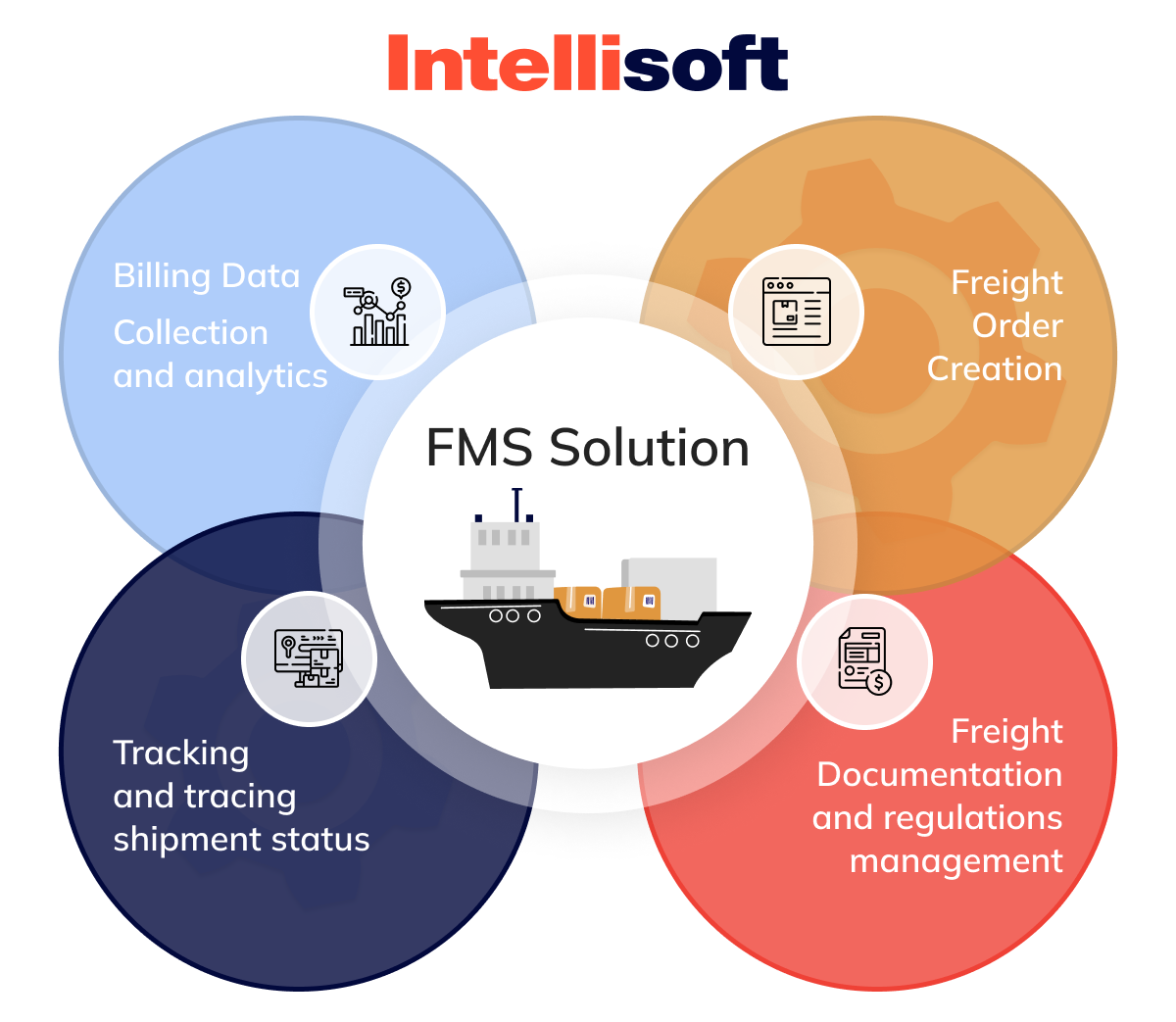
However, the modern logistics industry faces many challenges. For starters, customer expectations have skyrocketed. In an age where same-day delivery is becoming the norm, businesses are under immense pressure to deliver faster, more efficiently, and at a lower cost.
Then, there’s the issue of globalization. The expansion of trade routes and markets means logistics operations now span continents and time zones, adding layers of complexity to freight management. And let’s not forget the ever-tightening web of regulations and compliance requirements that vary wildly from one region to another.
On top of all the new problems, environmental concerns are also coming to the forefront. There’s a growing push for sustainable practices, adding another dimension to the freight management puzzle.
The Role of Technology in Transforming Freight Management
So what is freight management system purpose? How can it solve emerging problems? With the use of modern technologies, of course. It’s time to unpack how IntelliSoft uses technology to revolutionize freight management.
Big Data Analytics
Think of big data analytics as the most talented detective, the Sherlock Holmes of logistics, if you will. It sifts through mountains of data to come up with insights that were previously hidden or simply too time-consuming to uncover. From optimizing routes to predicting market trends, big data analytics can empower your businesses to make smarter, data-driven decisions.
Cloud Logistics
The cloud computing concept is a supercomputer in your pocket. You don’t need to have powerful hardware to benefit from it. And cloud logistics is the same – only for managing freight. Besides, it allows for better accessibility, scalability, and flexibility. By using a cloud-based system, your company can manage its operations from anywhere, scale up (or down) as needed, and ensure that its operational data is always up-to-date and secure.
Internet of Things (IoT)
IoT is the magic wand that turns ordinary objects into a network of smart, communicating devices. In freight management, this concept translates to real-time tracking of shipments, monitoring of cargo conditions, and automation of various logistics processes. IoT allows you to track your cargo’s location and condition in any given moment. As a result, you achieve real-time supply chain visibility. This level of visibility enables your business to respond swiftly to any disruptions, make informed decisions on the fly, and, ultimately, keep your customers happy.
The evolution of freight management is a tale of overcoming obstacles, embracing change, and constantly striving for better, faster, and more efficient ways of getting things done. At the heart of this evolution is technology. Breakthrough digital solutions propel the industry from the analog days of the past to the digital, interconnected world of today and tomorrow.
Why Develop a Custom Freight Management System?
Developing a custom freight management system (FMS) can be compared to deciding to bake a cake from scratch instead of buying one off the shelf. Sure, the store-bought cake is quick and easy, but will it have that special ingredient to make it truly remarkable? Will it satisfy your taste and preferences fully? Similarly, while off-the-shelf FMS solutions offer convenience, they often miss the secret sauce that makes your logistics operations stand out. Let’s discuss some of the main reasons why custom FMS development might be your strategic necessity.
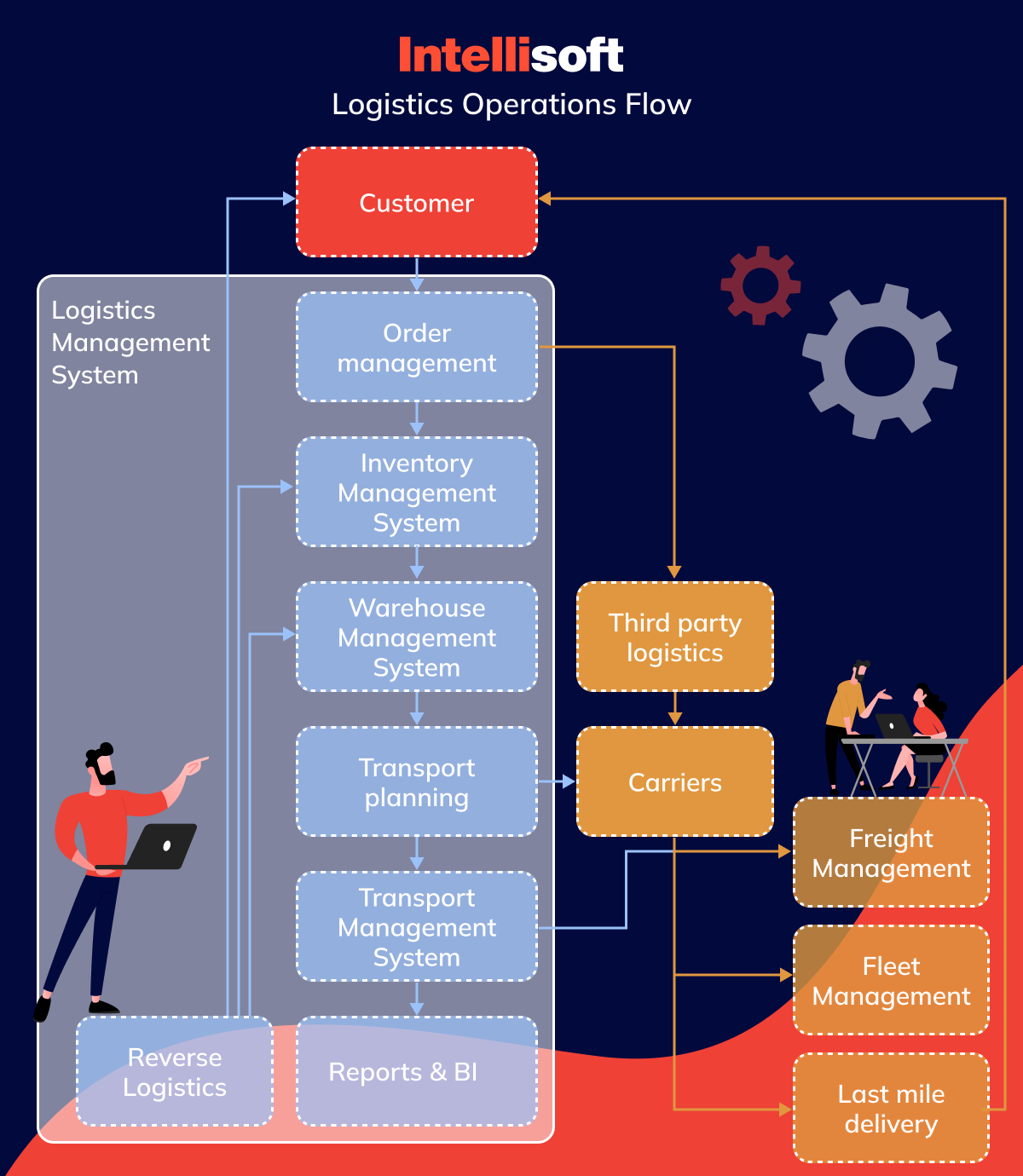
Limitations of Off-the-Shelf Solutions
Off-the-shelf FMS solutions are the one-size-fits-all t-shirts of the software world. They’re designed to meet the general needs of a broad audience, which sounds great in theory. However, just like a one-size t-shirt can’t fit everyone perfectly, these solutions often fall short when it comes to addressing the unique challenges and requirements of your business.
One major limitation is the lack of flexibility. These systems come with a set of predetermined features, and modifying them to fit your specific needs can be as challenging as convincing a cat to take a bath. You might find yourself paying for features you don’t need or, worse, lacking the ones you do.
Another downside is limited scalability. As your business grows and evolves, your FMS needs to keep up. Off-the-shelf solutions might work fine when you’re a small to medium-sized operation, but as you expand, they can become more of a hindrance than a help. It may feel like trying to navigate a growing city with an outdated map.
Benefits of Custom Solutions
Now, let’s talk about our main subject – custom FMS solutions. Developing a custom system is like having a tailor-made suit. Such a solution fits your business like a glove and adapts to your growth and changes over time.
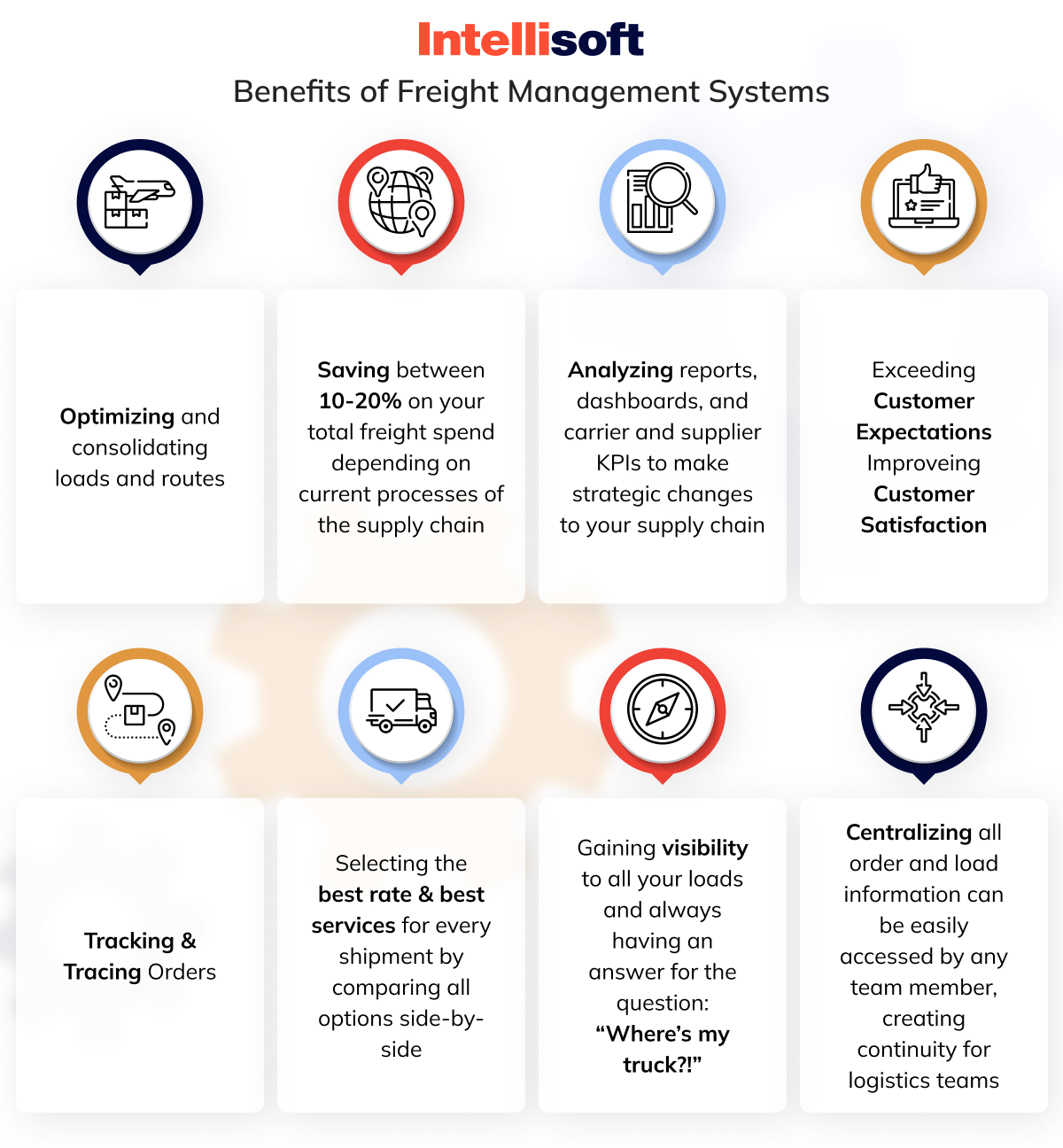
The most significant advantage of a custom FMS is the ability to tailor features specifically to your business needs. You can decide exactly what you want your system to do. Need a complex route optimization algorithm? Done. Do you require specific reporting and analytics tools? You got it. Every element of your FMS is crafted to support and enhance your unique operations.
Another feather in the cap of custom FMS software is scalability. As your business grows, your system grows with you. Easy scalability means you can start with a basic framework and add features and functionalities as needed without having to overhaul your entire system. We all love playing video games where you can unlock new levels and tools as you progress. A scalable FMS system feels similar – except this game is your business, and the rewards are real.
Last but not least, custom FMS solutions offer superior integration capabilities. In today’s interconnected world, your FMS doesn’t operate in isolation. It needs to talk to other systems – be it your ERP, CRM, or accounting software. A custom solution ensures seamless integration, enabling a smooth flow of data across your business ecosystem. This interconnectivity is crucial for making informed decisions, enhancing efficiency, and providing top-notch service to your customers.
The decision to develop a custom ground, ocean, or air freight management system is not a whim or desire to build a fancy new tool. The main reason is the necessity of equipping your business with a strategic asset that drives efficiency, supports growth, and provides a competitive edge in the fast-paced world of logistics. So, while off-the-shelf solutions might seem tempting, remember that in the long run, a custom FMS is the secret ingredient to your logistics success recipe.
Related readings:
- How To Develop An App For Logistics Business: Detailed Guide
- How to Develop Logistics Management System: Timeframe, Tech Stack, and Costs
- How Predictive Analytics Solutions Are Benefitting Supply Chain
- Machine Learning in Logistics Industry: Benefits and Use Cases
- Ultimate Warehouse Optimization With Smart Warehouse Technologies
Key Features of Freight Management Systems
A well-designed freight management system offers a variety of features that make FMS indispensable in the modern logistics landscape. Imagine having a universal tool that can solve your day-to-day problems in your logistics operations. Let’s discuss some of the key features.
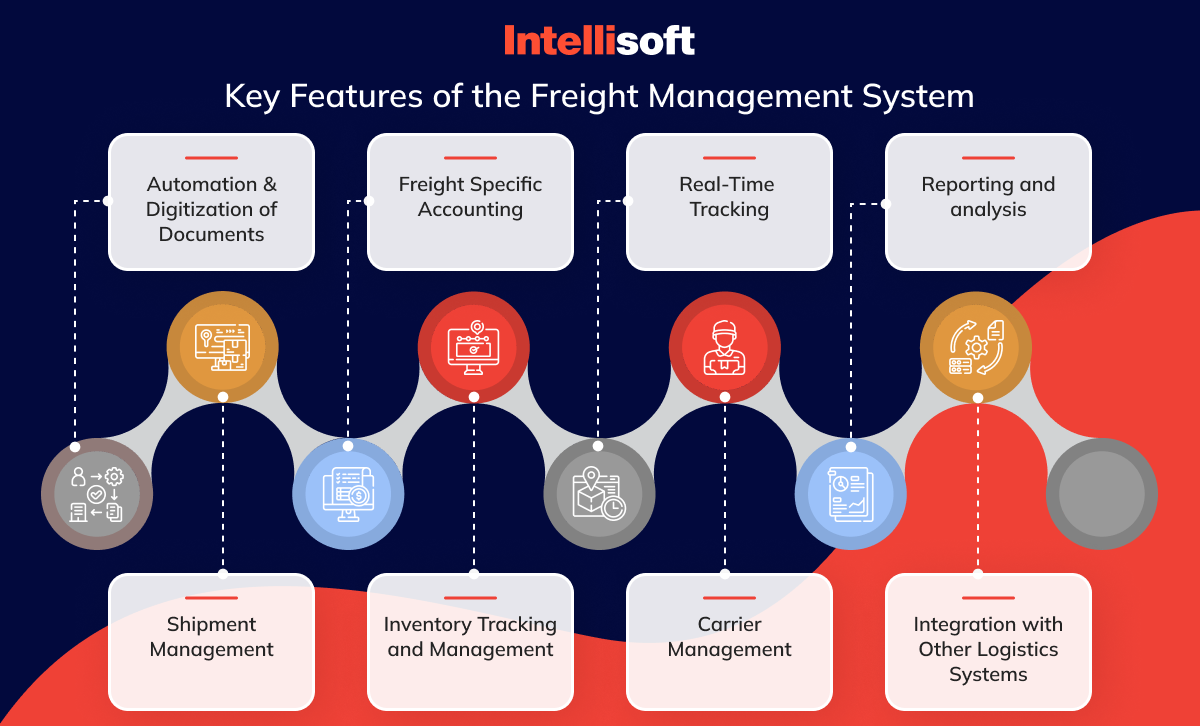
Automation
First up, we have automation, the silent hero of efficiency. In the realm of FMS, automation takes center stage, particularly in shipping and delivery scheduling. Planning routes and schedules efficiently can be as hard as solving a complex jigsaw puzzle. Now, imagine a system that can solve this problem for you automatically, every single day, with precision and efficiency.
With automated shipping and delivery scheduling, the system analyzes all of the factors: traffic patterns, delivery windows, vehicle availability, driver schedules, and so on. As a result, FMS comes up with the most efficient routing and scheduling plan. The best thing is that the system adapts to real-time changes, ensuring that your operations are as smooth as a well-oiled machine.
Documentation and Regulation Management
Doing the paperwork and navigating regulatory requirements in logistics can be as hard as finding your way through a maze blindfolded. This is where FMS steps in with its documentation and regulation management aspect. This feature acts as your compass in the maze, helping you manage and stay compliant with the myriad of shipping documents, customs regulations, and compliance standards across different regions.
From generating shipping labels to managing bills of lading, customs declarations, and freight quotes, this feature ensures that all your documentation is accurate, up-to-date, and in compliance with the relevant regulations. FMS becomes your personal assistant who organizes your books and ensures they’re all up to the latest regulatory standards.
Shipment Management
Shipment management is the heart of any FMS. This feature oversees the entire lifecycle of a shipment – from the moment it leaves your warehouse until it reaches its destination. It’s the conductor of your freight management orchestra, ensuring that every section plays in harmony.
Real-time tracking, status updates, and exception management – these are just a few facets of shipment management. It enables you to keep a watchful eye on your shipments, anticipate and manage delays, and communicate effectively with customers and partners. The system allows you to track each shipment, giving you a bird’s eye view of your logistics operations.
Freight Specific Accounting
Your FMS also wears its accounting hat, managing the financial aspects of freight management. From freight billing and invoicing to cost tracking and analysis, this feature ensures that your finances are as tightly managed as your freight.
Freight-specific accounting provides detailed insights into your cost structures, helping you identify areas of inefficiency and opportunities for cost savings. FMS acts as a financial analyst dedicated to your freight operations, constantly crunching numbers to keep your finances in good shape.
Real-time Freight Tracking
This feature brings transparency and control to your logistics operations. Real-time shipment tracking provides live updates on location and status. Using this feature, you can be sure your goods are on the right path, proactively address potential delays, and communicate accurate delivery timelines to your customers. It’s like having a GPS for every item in transit, ensuring nothing ever gets lost in the shuffle.
Inventory Tracking and Management
This aspect of the ground, ocean, or air freight management system gives you a comprehensive view of your inventory levels, locations, and movements. Real-time inventory tracking informs stock decisions, preventing shortages and waste. This feature ensures that your inventory management is predictive and strategic, making it a cornerstone of efficient logistics management.
Cargo and Carrier Management
Cargo and carrier management is the backbone of freight operations. This feature helps you manage the various aspects of your cargo and the carriers you use to transport it. Think of it as a matchmaker that pairs the right cargo with the right carrier, taking into account such factors as cargo specifications, carrier capacities, and transportation costs. It streamlines the selection process, contract management, and performance tracking, ensuring that your cargo is always in good hands.
Reporting and Analysis
The reporting and analysis feature of an FMS helps you reflect on past actions and guides future decisions. It offers a wealth of data and insights, turning raw data into actionable intelligence. From performance metrics to cost analysis, this feature helps you understand the effectiveness of your logistics operations, identify trends, and make data-driven decisions. With robust reporting tools at your disposal, you can continuously refine and optimize your logistics strategies.
Freight Rate Management
Freight rate management software comes into play, serving as vital tools in the efficient and cost-effective management of logistics operations. It is a specialized component of FMS that focuses on the tracking, comparison, and analysis of freight rates. This software is instrumental in ensuring that logistics managers can secure the best possible rates for their shipments.
By using freight rate management software, you can efficiently navigate through the complexities of varying rates offered by different carriers, making informed decisions that align with your budget and delivery timelines. Freight rate management software enhances the overall functionality of the FMS, providing a strategic advantage in cost management.
A freight rate management system is a vital component within FMS that offers a more comprehensive approach to managing freight costs. It can encompass not only the tracking and comparison of rates but also the negotiation and contracting processes with carriers. A freight rate management system can be integrated seamlessly with other components of FMS, such as shipment tracking and inventory management.
Integration with Other Logistics and ERP Systems
Last but not least, the ability to integrate with other logistics and ERP systems is what makes an FMS a real industry powerhouse. In today’s interconnected world, an FMS cannot operate in isolation. It needs to communicate and collaborate with other systems – be it your ERP, CRM, or warehouse management software.
This integration ensures a seamless flow of information across your business ecosystem, enhancing efficiency, reducing data redundancy, and ensuring consistency. It turns an FMS into a universal tool that controls all aspects of your logistics operations.
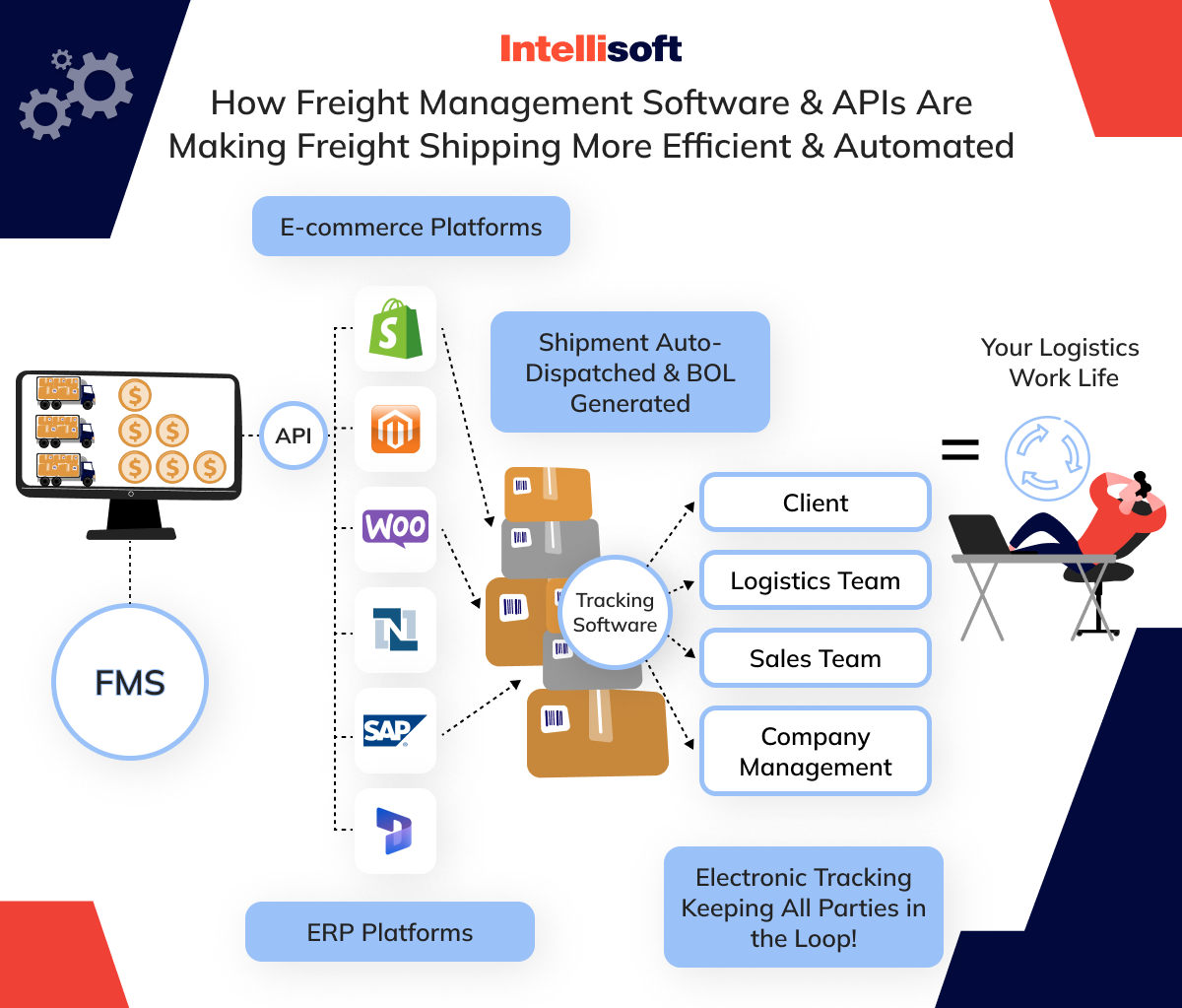
Each of these features plays a pivotal role in streamlining, optimizing, and revolutionizing freight management. These features effectively address current and future logistics needs, while also laying the foundation for continuous innovation and improvement. With such robust capabilities at your fingertips, an FMS becomes a necessity in the fast-paced, ever-evolving world of logistics and supply chain management.
Choosing the Right Technology Stack
To build a robust Freight Management System (FMS), you need to select the right technology stack. Each component must complement the others. The technology stack you choose drives the system’s capabilities and shapes its adaptability and scalability. Let’s navigate through the tech landscape to understand the technologies that are reshaping freight management systems.
For cloud computing, platforms such as Amazon Web Services (AWS), Microsoft Azure, and Google Cloud Platform (GCP) are at the forefront. These platforms provide the infrastructure and services necessary for hosting and scaling freight management system software. AWS, for instance, offers a range of services like Amazon EC2 for scalable computing capacity, Amazon S3 for data storage, and AWS Lambda for running code in response to events.
Efficient database management is crucial for handling the vast amounts of data generated in freight management. Tools like MongoDB, a NoSQL database, are ideal for managing large volumes of unstructured data. For more structured data management, PostgreSQL or MySQL can be used, offering robustness and scalability for transactional data.
For implementing IoT functionalities, platforms such as ThingWorx or Microsoft Azure IoT provide comprehensive solutions for connecting and managing IoT devices, collecting data, and integrating with other systems. These platforms facilitate real-time tracking and monitoring of shipments and assets.
When it comes to AI and machine learning, tools such as TensorFlow, Apache Spark MLlib, and IBM Watson provide powerful capabilities for predictive analytics, route optimization, and decision-making automation. These technologies help analyze patterns, forecast demand, and optimize logistics operations.
Integrating with other logistics, ERP systems, or third-party services is made seamless through APIs. Tools such as MuleSoft or Apache Camel offer a platform for connecting applications, data, and devices across on-premises and cloud computing environments. They enable the FMS to integrate and communicate with other systems, ensuring a unified workflow.
For the front-end development of web and mobile applications, frameworks such as React (for web applications) and React Native (for mobile applications) are popular choices. They offer flexibility and a rich set of features for creating responsive and user-friendly interfaces.
On the back-end side, languages and frameworks such as Node.js, Java with Spring Boot, or .NET Core provide a robust foundation for building scalable server-side applications. They support a wide range of functionalities required in freight management systems, from processing logistics data to handling user requests.
Security is paramount in freight management system software. Tools such as OpenSSL for encryption, Okta for identity management, and Fortify for code security help safeguard data and ensure secure operations of the FMS.
The Role of Mobile Solutions in Freight Management
As the need for operations to get faster rises, it’s clear that mobile solutions are no longer just an add-on but a necessity in freight management. In our fast-paced world, the ability to manage and track freight on the go is crucial. Mobile applications bring the power of an FMS to your fingertips, offering real-time access to critical information no matter where you are.
Mobile apps in freight management extend the capabilities of traditional FMS, making them more accessible and user-friendly. They enable on-the-go tracking, quick decision-making, and efficient communication between drivers, logistics managers, and customers. These apps can provide instant notifications on shipment status, document access, and even enable barcode scanning, which transforms smartphones into powerful logistics tools.
At IntelliSoft, our expertise in mobile app development encompasses a range of platforms, including React Native, Android, iOS, and Flutter, ensuring that we can cater to a diverse set of requirements and user preferences. Whether it’s a cross-platform app for broader reach or a native app for specific platform performance, our team is equipped to deliver seamless, intuitive, and robust mobile applications tailored to the unique needs of freight management.
Choosing the right technology stack for a Freight Management System is about finding the perfect synergy between various technologies. Each technology plays a distinct role in enhancing the efficiency, scalability, and effectiveness of FMS. At IntelliSoft, we leverage the latest innovations to ensure our FMS solutions are future-ready.
Steps to Develop a Freight Management System
Developing a Freight Management System (FMS) requires meticulous planning, a skilled team, and a harmonious blend of various development phases. Each step in this process is critical, playing a unique role in ensuring the final system meets the demands of modern logistics operations. Let’s walk through these steps.
Conceptualization and Planning
The task of creating an effective FMS begins with conceptualization and planning. This phase is the blueprint of your project – where ideas take shape and strategies are formed. It involves defining the scope, objectives, and specific requirements of the FMS. Key considerations include identifying the challenges to be addressed, the features needed, and the technological solutions to be employed.
At IntelliSoft, we approach this stage with a deep dive into understanding the client’s business processes and logistics challenges. We conduct thorough market research, analyze current trends, and predict future needs to ensure the FMS not only solves present problems but is also scalable for future demands.
Team Formation
The next crucial step is assembling the right development team for the job. The team should comprise skilled professionals with expertise in various areas crucial for FMS development, such as cloud computing, AI, IoT, database management, and software development.
At IntelliSoft, we carefully select our team members based on the individual needs of each project. Our teams often include:
- Solution architects
- Software developers
- Data scientists
- UI/UX designers
- Project managers
- QA managers
Each team member contributes unique skills and perspectives, resulting in a well-rounded and effective development process.
Design and Development Phases
The design and development phase starts with building a prototype. This initial model provides a tangible representation of the FMS, allowing stakeholders to visualize and provide feedback on the proposed solution. Prototyping is a crucial step for validating ideas and making iterative improvements before full-scale development begins.
User Interface (UI) and User Experience (UX) design are pivotal in ensuring the freight management software is user-friendly and intuitive. This stage involves designing the layout, visuals, and interaction flows of the system, focusing on ease of use, efficiency, and overall user satisfaction.
The development phase is where the actual coding and construction of the system take place. Our developers at IntelliSoft work with the chosen technology stack to build the core functionalities of the FMS, ensuring each feature is implemented according to the requirements outlined in the planning phase.
Testing and Deployment
Once the FMS is developed, rigorous testing is conducted. This stage includes various types of testing, such as functional, performance, security, and usability testing. The objective is to detect and resolve problems, guaranteeing a robust, secure, and satisfactory system.
After successful testing, the FMS is deployed. This stage involves installing the system in the client’s operational environment and ensuring it integrates seamlessly with existing processes and systems. Deployment is a critical step, requiring careful planning and execution to minimize disruptions to current operations.
Post-deployment, ongoing support, and maintenance are crucial. At IntelliSoft, we provide continuous support to address any emerging issues, update the system as required, and ensure it continues to function optimally over time.
Developing a Freight Management System is a comprehensive process that involves multiple interconnected steps. Each phase plays a vital role in ensuring the successful implementation of a robust and effective FMS. At IntelliSoft, our commitment to quality, innovation, and client satisfaction guides our approach to these steps, ensuring delivery of FMS solutions tailored to our clients’ unique needs.
Challenges in Developing Freight Management Systems
Developing a global freight management system is not without its challenges. Understanding these challenges, especially the technical and business aspects, is crucial in steering the development process towards success. Let’s explore these challenges and how IntelliSoft adeptly navigates through them.
Technical Challenges and How IntelliSoft Overcomes Them
Ensuring Scalability and Performance
As the logistics industry evolves, an FMS must be scalable and high-performing to handle increased loads and complex operations. IntelliSoft tackles this problem by using scalable cloud solutions and robust programming frameworks. We conduct thorough performance testing to ensure that the system can handle growth and fluctuating demands without compromising on speed or reliability.
Data Security and Privacy Concerns
With the handling of sensitive data, security is a paramount concern in FMS development. IntelliSoft approaches this challenge by implementing robust security protocols, including encryption, secure data storage, and regular security audits. We ensure compliance with international data protection regulations, such as GDPR, safeguarding against data breaches and unauthorized access.
Real-time Data Processing and Analysis
The ability to process and analyze data in real time is crucial for efficient logistics operations. IntelliSoft utilizes advanced data processing frameworks and real-time analytics tools. We leverage technologies such as stream processing and machine learning to provide actionable insights, helping businesses make informed decisions quickly.
Keeping Pace with Technological Advancements
The rapid pace of technological advancement presents both an opportunity and a challenge. Updating the Flight Management System (FMS) with the latest technology is essential for staying competitive. IntelliSoft stays at the forefront of technology by investing in continuous research and development, ensuring that our FMS software is always equipped with the latest and most efficient technologies.
At IntelliSoft, we approach developing robust FMS solutions with expertise, innovation and a deep understanding of the logistics industry.
The Cost of Developing a Custom Freight Management System
Talking about the cost of developing a custom Freight Management System (FMS) can be as complex as trying to pin down the price of building a house. It varies widely based on numerous factors, much like how the cost of a house depends on its location, size, design, and materials. For a custom FMS, the price tag typically ranges from $150,000 to $450,000, but let’s unpack what goes into these numbers.
Project Scope
The scope of the project is the bedrock of cost estimation. It’s about the “what” and “how much” of your FMS. Do you need a compact system focusing on specific logistics functions, or are you looking for an extensive solution covering every aspect of freight management? The broader and more complex the scope, the higher the cost. It’s like choosing between a cozy studio apartment and a sprawling mansion – the size and complexity make a big difference in price.
Team Composition
Who’s building your FMS? The composition of the development team is a crucial cost factor. You need a mix of experts – from software developers and data scientists to project managers and QA specialists. Each professional brings a different skill set and experience level to the table, influencing the cost. Hiring developers with niche-specific expertise, especially for advanced technologies like AI or IoT, can add to the cost. These specialists are in high demand and command higher rates.
Technology Stack
The technology stack – the set of technologies used to build the FMS – also plays a significant role in determining the cost. Advanced, cutting-edge technologies may offer superior functionalities, but can come with a higher price tag, both in terms of the technology itself and the expertise required to implement it.
Outsourcing as a Cost-Effective Solution
Outsourcing development can be a strategic move to manage costs. It allows you to tap into a pool of global talent, often at a more affordable rate than hiring in-house teams, especially for niche expertise. Outsourcing also reduces overhead costs associated with additional staff, such as workspace, equipment, and benefits.
The development timeline impacts the cost, too. A faster time to market typically requires more resources working simultaneously, leading to higher costs. At IntelliSoft, we collaborate closely with our clients to understand their budget constraints and requirements, ensuring that we offer a solution that meets their needs and provides the best value for their investment.
Future Trends in Freight Management Technology
As we step into the future, the landscape of freight management technology is poised for some groundbreaking transformations. These upcoming trends enhance efficiency, cut costs, and reshape the fabric of how the logistics industry operates. Let’s discuss these exciting technological advancements that are set to redefine freight management.
Artificial Intelligence and Machine Learning
AI and ML are already making waves in the logistics industry, but their potential is far from fully realized. In the future, we can expect these technologies to offer even more sophisticated solutions. Picture AI algorithms that can predict market trends, adjust routes in real-time based on traffic and weather conditions, and even anticipate maintenance needs for vehicles. ML will continue to evolve in pattern recognition, leading to more accurate forecasting models that can effectively handle the complexities of supply chain and freight management.
Digital Twins of Physical Systems
The concept of digital twins means creating virtual replicas of physical systems. Imagine having a complete digital mirror of your logistics network, one that you can use to simulate and analyze different scenarios. This technology allows logistics companies to test strategies in a virtual environment, reducing risks and costs of trial-and-error in physical operations.
Blockchain Technology
Blockchain is poised to introduce unprecedented transparency and security in freight management. By creating an immutable ledger of transactions and tracking, blockchain can provide a level of trust and verification that is currently lacking in many aspects of the supply chain. It could revolutionize how we handle contracts, track shipments, and manage freight data, ensuring authenticity and integrity at every step of the process.
Self-driving Vehicles and Drones
The future of freight management will see a greater integration of autonomous vehicles and drones. Self-driving trucks could soon become the norm for long-haul transportation, offering significant improvements in safety and efficiency. Drones, on the other hand, are set to transform last-mile deliveries, making them faster and more cost-effective, especially in hard-to-reach areas.
Augmented and Virtual Reality
AR and VR technologies are starting to make inroads into the logistics industry. In the future, we can expect these technologies to play a pivotal role in training and operations. AR can provide real-time, overlay information to workers in warehouses or during loading and unloading, enhancing accuracy and efficiency. VR could be used for training purposes, giving employees a realistic experience of different scenarios without the risks associated with real-life training.
Robotics and Automation in Warehouses
Robotics and automation in warehouses are not new, but their capabilities are rapidly expanding. Future warehouses will likely be dominated by automated systems and robots that can pick, sort, pack, and store goods with remarkable speed and precision. This automation will speed up operations and reduce the scope for error and injury in warehouse environments.
The future of freight management technology is brimming with potential. Each of these innovations holds the promise of making freight management more efficient, secure, and adaptable to the ever-changing needs of the market. As these technologies continue to evolve and intersect, they will undoubtedly unlock new possibilities and opportunities in the world of logistics and freight management.
Conclusion
It’s clear that the landscape of logistics and freight management is both dynamic and complex. Each aspect of freight management software plays a crucial role in shaping efficient and effective freight management solutions. The world of logistics is continuously evolving, driven by technological advancements and changing market demands. The integration of cutting-edge technologies paves the way into the future, redefining the efficiency, transparency, and agility of logistics operations.
Now, it’s more important than ever to have a reliable, innovative, and expert partner to navigate the complexities of FMS development. This is where IntelliSoft steps in. Our team of top-level professionals, with deep industry expertise, is committed to leveraging the latest technologies to help you develop a future-proof Freight Management System.
Whether you’re looking to upgrade your existing system or build a new one from the ground up, IntelliSoft is your ideal partner. We bring a blend of industry knowledge, technical expertise, and a client-centric approach to each project, ensuring effective and transformative solutions.
Contact IntelliSoft and take your first step towards a cutting-edge freight management software tailored to your business needs. Let’s navigate the future of logistics together!


